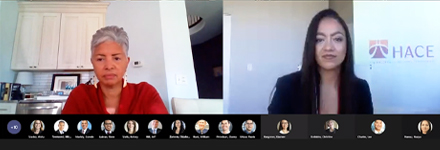
The impact of the COVID pandemic on the country’s most challenged communities has combined with months of social protests to create new expectations in the workplace and society, the head of a Hispanic alliance for career development told colleagues at William Blair’s latest Crucial Conversation talk held online October 7.
“Social injustices have always been there, but they are coming to light in a way we’ve never seen before,” said Patricia Mota, CEO of the Hispanic Alliance for Career Enhancement (HACE). “We can all do something big or small to move to a more inclusive, equitable society.”
Mota, a daughter of Mexican immigrant parents and a trailblazer for the advancement of Latinos, has made it her personal and professional mission to create a more inclusive work environment. She learned first-hand, beginning as a high school student, the value of closing traditional gaps in education and career-opportunities. She joined HACE in 2010 and was promoted to CEO four years later.
HACE, founded in 1982, is a national nonprofit dedicated to the employment, development, and advancement of Latino professionals. With 64,000 members nationwide, HACE works with employers to help them attract, develop, and retain Latino and diverse professionals.
Closing the gap
Among Mota’s accomplishments at HACE is the creation and expansion of professional and student leadership programs nationwide. She is particularly proud of the group’s Women Leadership Program, a development course geared for Latino managers or those seeking executive roles.
The training program, with 1,700 alumni, is now offered in 10 cities across the country. Of those who have attended, 70% report that they have received a promotion and pay increase within 12 months of completion, Mota says.
“That’s getting them closer to closing the gap,” she adds.
A reflection on values
Mota said that a core element in all HACE’s learning and development programs is a reflection on cultural values—especially by study and discussion of the nuances of commonly held Latino values and traditional corporate values.
“Respect for authority” and “working hard” are traditional Latino values, she explained, whereas “challenging authority” and “working smarter” are strong corporate values.
“It’s not about assimilating,” Mota emphasizes. “It’s about how are you adapting certain behaviors, certain communication styles in order to be more effective with the receiver—whether an individual, a group, an employer—so they see what you bring to the table and see you as a leader.”
The October 7 event, held in celebration of Hispanic Heritage Month, was the fourth in a series of I&D online conversations this year to support a workplace culture of inclusion and diversity where all voices are heard and valued.


